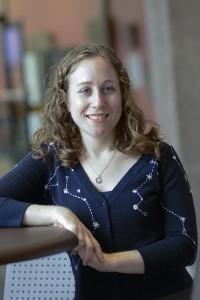Scientific American Editor Moskowitz ’05 is Woman Physicist of the Month

The American Physical Society (APS) named Clara Moskowitz ’05 the Woman Physicist of the Month for December 2015. A senior editor at Scientific American, she was an astronomy and physics double major at Wesleyan. It was in her senior year that she discovered her “favorite part” of her undergraduate career: her thesis.
“I was fascinated by science from a very young age,” she says, “but so many people feel separated from science—as though they can’t get it. I realized that I like writing and I like to communicate the concepts for nonscientists.” After earning a graduate degree in science journalism at the University of California, Santa Cruz, Moskowitz then joined the online publication Space.com, where she covered NASA’s space shuttle missions and other astronomy news. Two years ago, she joined the venerable Scientific American: “We try to keep it current and stay true to its legacy,” she notes.
Moskowitz recalls her favorite assignment at the magazine—which she focused on both historic import and present application: she served as editor of the theme issue on 100 years of general relativity (Sept. 2015, Vol. 313, Issue 3).
“Einstein is such a fascinating figure; he singlehandedly revolutionized science just by thinking about problems: he went through in his mind exactly what it would be like to ride a beam of light. A hundred years after he proposed the theory, we are still thinking about it, still using it—in our cellphones, GPS devices, and satellites.
“His realization that gravity is not so much a force that pulls things together—but rather that it comes from the shape of space and time—is such a beautiful idea.”
As for her success with the project, editor-in-chief Mariette DiChristina wrote, “Issue editor Clara Moskowitz and the team have created a special report that is profound yet playful and sparkles with the wonder of discovery—rather like the great man himself. We hope you enjoy reading [this issue] as much as we did putting it together.”
Said Moskowitz, “I’m constantly working hard to make science understandable. I want everyone to see what’s so cool about it.”
Reached at the American Astronomical Society’s January 2016 meeting, which she was covering for Scientific American, Moskowitz was most excited about a recent talk she attended about astronomers planning to use telescopes all over the world in conjunction, in order to capture the event horizon of the black hole that astronomers think lies at the center of our galaxy. The project—which could further prove the theory of general relativity, or call for modifications—will take its first images of the black hole in 2017.
“A lot of us are on the edge of our seats until we get the results,” Moskowitz said.
Moskowitz also was back at Wesleyan on Jan. 16 for the Conference for Undergraduate Women in Physics, where she spoke about her career path. She will present a Physics Department colloquium on March 3 about science journalism.

